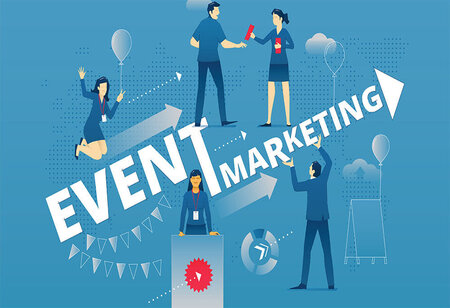Benefits Of Event Marketing Strategy for Startups
By Tanuja Akkannavar
 When a business, product, or service is promoted through an event, it's called an event marketing campaign. Companies can conduct their events, attend as exhibitor firms, or sponsor company events, whether physically or online. One of the primary reasons businesses attend or hold events is to create and strengthen their brand identity. There are several sorts of event marketing, including industry events organized by a single firm, trade exhibitions, and digital products such as virtual meetings or live broadcasting seminars. Take into consideration who your customers are and the kind of events they're likely to attend when choosing the best strategy.
When a business, product, or service is promoted through an event, it's called an event marketing campaign. Companies can conduct their events, attend as exhibitor firms, or sponsor company events, whether physically or online. One of the primary reasons businesses attend or hold events is to create and strengthen their brand identity. There are several sorts of event marketing, including industry events organized by a single firm, trade exhibitions, and digital products such as virtual meetings or live broadcasting seminars. Take into consideration who your customers are and the kind of events they're likely to attend when choosing the best strategy.
Effective promotional activities are an important part of any successful event marketing strategy since they motivate prospective attendees to make a purchase. Inbound and outbound marketing methods such as email, social media, event discovery sites, remarketing, and SEO are all used to promote the event.
Unlike other forms of marketing, events allow you to connect with your audience in a way that is impossible with other mediums. Therefore, here are some major benefits of an event marketing plan that will help you achieve certain essential start-up objectives.
1. Revenue Generation –
95 percent of marketers feel that in-person events may have a significant influence on accomplishing their organization's core business objectives, making event marketing an essential part of their strategy. Attendee registration alone produces a list of potential customers who already are interested in buying the product or service. There are several ways you may generate leads during an event, such as via an email newsletter, sample demonstration, or through conducting games.
2. Increased Brand Awareness –
You may meet a broad spectrum of potential customers by presenting at or engaging in events, and this can open doors for your business. Numerous event organizers allow exhibitors to sponsor portions of the event. Attendees are more likely to connect with your business if they see a spokesperson of your company address or if your company's name appears on a freebie.
3. A Platform for Building Customer Relationships –
Marketing at events is all about building long-term connections with the people who will be there. From a website, an advertising campaign, or even social media, you won't be able to build as strong a relationship with clients.
4. Personal Contact with Customers and Clients –
Developing a relationship and gaining your consumers' confidence begins with face-to-face interactions. Don't forget about your current clients, though. With existing customers, it's possible to establish relationships and create loyalty just by having a cup of coffee and chatting. If you don't have the appropriate people on your team at the event, make sure they are properly informed and aligned with your company's aims and objectives before the event begins. It's important to determine who will be on your stand and who will be on the floor when you attend trade exhibitions or conferences. Organize meetings with your sales staff to maintain your booth crowded and active.
5. Credibility and Thought Leadership –
A developing or high-profile trend might be a great chance to tie your brand with your thought leadership, there are several ways in which brands may profit from being thought leaders. Being a thought leader may boost your brand's trustworthiness in the eyes of your competitors. You may find yourself the go-to source of analysis for journalists and get important free publicity as a result of this. Your brand's important insights on what's occurring in a particular market or due to a new technology might serve as the basis for thought leadership. It might be based on the thoughts of executives and backed up by the results of a desk study. Because putting on an event may be expensive, the organizers search for ways to recoup their costs via speaking engagements and advertising. Roundtable discussions and panel discussions are two common ways in which event sponsors are allowed to talk about their company's thoughts and forecasts.




